Preparations for the upcoming parliamentary elections have pushed most Lebanese issues to be postponed until after the scheduled elections on May 15, to avoid these topics becoming contentious between political powers or between authority and their popular bases. The only exception is the negotiation file with the International Monetary Fund (IMF), which is reportedly proceeding "at a rapid pace," alongside related issues, according to parliamentary sources following the matter. The pressures from crises and legal deadlines for some obligations necessitate exceptional action from the government and the parliament to announce the public budget and meet the demands of the Arab community, which requires reforms in exchange for assisting the country engulfed in its crises. However, the current situation suggests that approving the budget has become "very difficult before the elections," according to parliamentary sources; yet they confirm that the negotiations with the IMF "are moving swiftly," expecting a significant breakthrough within two weeks.
#### IMF Negotiations
A delegation from the IMF began a new round of discussions with Lebanese officials last Wednesday, lasting 15 days. The Lebanese presidency reported after a meeting between President Michel Aoun and the delegation that Aoun "noted progress in the negotiations path that could lead to a preliminary signing of a memorandum of understanding before signing the final contract." The delegation continued its rounds with Lebanese officials over the past two days. Parliamentary sources indicated that all issues related to the negotiations with the IMF "are moving in the right direction," referring to the financial and economic recovery plan and the approval of the "capital control" law. They explained that "if all arrangements are completed after the law's approval by the government, a parliamentary session could be convened to approve it after the middle of this month," emphasizing that the urgency of finalizing this file stems from its connection to the negotiations with the IMF. The completion of the law remains contingent upon legal arrangements; the bill awaits being sent to the general assembly of the parliament according to legal procedures, after which the speaker of the assembly will refer it, as per the law, to the relevant parliamentary committees for review and approval before sending it back to the general assembly.
The observations of ministers from the "Shia duo," represented by "Amal Movement" and "Hezbollah," are not viewed as obstacles to the law's approval. Sources close to the duo told "Asharq Al-Awsat" that there is opposition to some details of the project, "which will be discussed in the parliamentary committees and in the parliament for rectification."
#### Election Priority
While authorities are addressing these interconnected issues with "absolute seriousness," considering that "the government is working its utmost to accomplish what is required of it," as its ministers reiterate, other files face stagnation that does not instill confidence that their completion will be ensured before the elections. Some political forces are treating holding the elections on time as an "absolute priority," according to sources close to the "Amal Movement," emphasizing that the current priority is "to close any loopholes that could jeopardize or delay the electoral process."
This priority is mirrored in other political forces that are also prioritizing elections, which reflects on accomplishing other required obligations, such as the public budget file, which is being thoroughly assessed in the finance and budget committee in the parliament. Sources involved in the committee's work are skeptical about the budget being finalized quickly, as it "needs a comprehensive study of all details." Notably, opposing sources believe that its approval will expose political forces to public criticism, given that the budget includes additional fees that will increase the suffering of Lebanese citizens whose purchasing power has deteriorated. The finance and budget committee is set to resume its meetings next Tuesday.
#### Electricity and Border Demarcation
While this file is following a path to soothe any tensions with grassroots, other indicators show international difficulties in advancing Lebanese files, such as the import of electricity and gas from Jordan and Egypt, funded by the World Bank. This file is currently stagnating without any breakthrough, although the Lebanese Energy Ministry has completed everything required of it, according to its sources, waiting for a date to sign the contract in Egypt for gas import and a signal from the World Bank to start the supply, as the World Bank is the funding body for this gas to generate power in northern Lebanon. Concurrently, recent weeks have indicated that the file for maritime border demarcation with Israel has not been completed due to international developments.
However, new signs have begun to emerge showing that the file has not been entirely frozen. Informative Lebanese sources on this file's discussions told "Asharq Al-Awsat" that the U.S. ambassador to Lebanon, Dorothy Shea, "is making efforts within Lebanon to revive the file," clarifying that she is "acting within a mission to mature and complete the negotiations," refuting at the same time that the file has been withdrawn from discussion or frozen.
Lebanon has expressed its commitment to the U.S. mediation and the necessity of continuing it in light of proposals made by the U.S. mediator Amos Hochstein. The Lebanese sources noted that the U.S. side, which plays the role of facilitator, along with the United Nations, "does not oppose the framework agreement that has been announced and that Lebanon has reaffirmed its commitment to in the new rounds of negotiations." They added, "The mere return to the framework agreement confirms that border negotiations are still within their normal course since the agreement is the only available mechanism for border demarcation," in addition to the fact that border demarcation and Lebanese gas extraction "have become a necessity for Europe and the U.S. in these circumstances."




